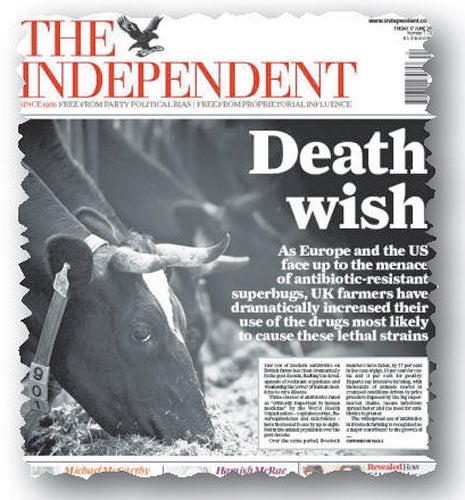Warning over drug-resistant salmonella superbug

Your support helps us to tell the story
From reproductive rights to climate change to Big Tech, The Independent is on the ground when the story is developing. Whether it's investigating the financials of Elon Musk's pro-Trump PAC or producing our latest documentary, 'The A Word', which shines a light on the American women fighting for reproductive rights, we know how important it is to parse out the facts from the messaging.
At such a critical moment in US history, we need reporters on the ground. Your donation allows us to keep sending journalists to speak to both sides of the story.
The Independent is trusted by Americans across the entire political spectrum. And unlike many other quality news outlets, we choose not to lock Americans out of our reporting and analysis with paywalls. We believe quality journalism should be available to everyone, paid for by those who can afford it.
Your support makes all the difference.A potentially deadly drug-resistant form of salmonella is spreading across the world and has already infected hundreds of people in Britain, scientists have warned.
The S. Kentucky "superbug" variant of salmonella bacteria appears to have developed due to the use of antibiotics in chicken and turkey farming, rendering it untreatable by those same drugs once it has infected humans.
Symptoms of salmonellosis, the common food poisoning illness that arises from an infection by the bacteria, usually involve nothing more serious than diarrhoea or vomiting. But it can present far more serious problems for the elderly or those with weakened immune systems – of the 1.7 million infections that occur in the US and Canada every year, 2,800 are fatal.
That number would be higher but for the use of the antibiotics whose effectiveness is now at risk from S. Kentucky, which infected 244 people in England and Wales between 2000 and 2008, according to the research.
It is thought that the strain originated in chickens and turkeys from Ethiopia, Nigeria and Morocco, and that cases in Europe have occurred through imported meat and travel to those countries. But concern has been growing for some time at the burgeoning use of antibiotics in British farming too, and in May the presence of one "homegrown" superbug – a new type of MRSA – was identified in milk.
As The Independent reported in June, three kinds of drugs described by the World Health Organisation as "critically important in human medicine", are being used on animals as much as 800 per cent more than a decade ago, despite a fall in the number of farm livestock. Significantly it is one of those three types, fluouroquinolones, that is used to treat salmonellosis.
Worries about resistance have also led to calls for the NHS to reduce the use of antibiotics. Last week it was revealed by the health magazine Pulse that ministers want to cut use of the drugs by holding GPs to account for how often they prescribe them.
The research detailing the spread of S. Kentucky, carried out by the Pasteur Institute in France and published in The Journal of Infectious Diseases, appeared all the more serious as its conclusions were announced on the same day that an outbreak of a separate, drug-resistant strain of the bacteria was confirmed in the US. That strain, S. Heidelberg, has so far killed one person and infected 77 others.
One of the scientists who conducted the study, Dr Simon Le Hello, said: "We hope that this publication might stir awareness among national and international health, food, and agricultural authorities so that they take the necessary measures to control and stop the dissemination on this strain before it spreads globally."
Join our commenting forum
Join thought-provoking conversations, follow other Independent readers and see their replies
Comments